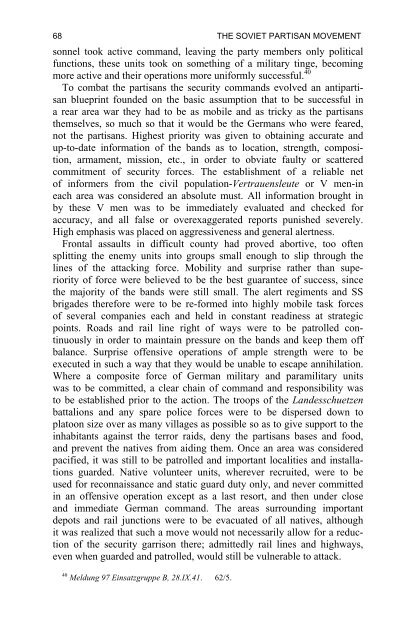the soviet partisan movement 1941-1944 by edgar m. howell
the soviet partisan movement 1941-1944 by edgar m. howell
the soviet partisan movement 1941-1944 by edgar m. howell
Create successful ePaper yourself
Turn your PDF publications into a flip-book with our unique Google optimized e-Paper software.
68 THE SOVIET PARTISAN MOVEMENT<br />
sonnel took active command, leaving <strong>the</strong> party members only political<br />
functions, <strong>the</strong>se units took on something of a military tinge, becoming<br />
more active and <strong>the</strong>ir operations more uniformly successful. 40<br />
To combat <strong>the</strong> <strong>partisan</strong>s <strong>the</strong> security commands evolved an anti<strong>partisan</strong><br />
blueprint founded on <strong>the</strong> basic assumption that to be successful in<br />
a rear area war <strong>the</strong>y had to be as mobile and as tricky as <strong>the</strong> <strong>partisan</strong>s<br />
<strong>the</strong>mselves, so much so that it would be <strong>the</strong> Germans who were feared,<br />
not <strong>the</strong> <strong>partisan</strong>s. Highest priority was given to obtaining accurate and<br />
up-to-date information of <strong>the</strong> bands as to location, strength, composition,<br />
armament, mission, etc., in order to obviate faulty or scattered<br />
commitment of security forces. The establishment of a reliable net<br />
of informers from <strong>the</strong> civil population-Vertrauensleute or V men-in<br />
each area was considered an absolute must. All information brought in<br />
<strong>by</strong> <strong>the</strong>se V men was to be immediately evaluated and checked for<br />
accuracy, and all false or overexaggerated reports punished severely.<br />
High emphasis was placed on aggressiveness and general alertness.<br />
Frontal assaults in difficult county had proved abortive, too often<br />
splitting <strong>the</strong> enemy units into groups small enough to slip through <strong>the</strong><br />
lines of <strong>the</strong> attacking force. Mobility and surprise ra<strong>the</strong>r than superiority<br />
of force were believed to be <strong>the</strong> best guarantee of success, since<br />
<strong>the</strong> majority of <strong>the</strong> bands were still small. The alert regiments and SS<br />
brigades <strong>the</strong>refore were to be re-formed into highly mobile task forces<br />
of several companies each and held in constant readiness at strategic<br />
points. Roads and rail line right of ways were to be patrolled continuously<br />
in order to maintain pressure on <strong>the</strong> bands and keep <strong>the</strong>m off<br />
balance. Surprise offensive operations of ample strength were to be<br />
executed in such a way that <strong>the</strong>y would be unable to escape annihilation.<br />
Where a composite force of German military and paramilitary units<br />
was to be committed, a clear chain of command and responsibility was<br />
to be established prior to <strong>the</strong> action. The troops of <strong>the</strong> Landesschuetzen<br />
battalions and any spare police forces were to be dispersed down to<br />
platoon size over as many villages as possible so as to give support to <strong>the</strong><br />
inhabitants against <strong>the</strong> terror raids, deny <strong>the</strong> <strong>partisan</strong>s bases and food,<br />
and prevent <strong>the</strong> natives from aiding <strong>the</strong>m. Once an area was considered<br />
pacified, it was still to be patrolled and important localities and installations<br />
guarded. Native volunteer units, wherever recruited, were to be<br />
used for reconnaissance and static guard duty only, and never committed<br />
in an offensive operation except as a last resort, and <strong>the</strong>n under close<br />
and immediate German command. The areas surrounding important<br />
depots and rail junctions were to be evacuated of all natives, although<br />
it was realized that such a move would not necessarily allow for a reduction<br />
of <strong>the</strong> security garrison <strong>the</strong>re; admittedly rail lines and highways,<br />
even when guarded and patrolled, would still be vulnerable to attack.<br />
40<br />
Meldung 97 Einsatzgruppe B, 28.IX.41. 62/5.
















